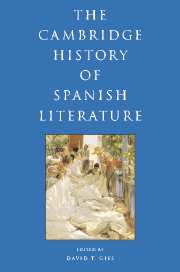Book contents
- Frontmatter
- I INTRODUCTION
- II HISTORY AND CANONICITY
- III THE MEDIEVAL PERIOD
- IV EARLY MODERN SPAIN: RENAISSANCE AND BAROQUE
- V THE ENLIGHTENMENT AND NEOCLASSICISM
- VI THE FORGING OF A NATION: THE NINETEENTH CENTURY
- VII THE MODERN, MODERNISMO, AND THE TURN OF THE CENTURY
- VIII TWENTIETH-CENTURY SPAIN AND THE CIVIL WAR
- IX IN AND OUT OF FRANCO SPAIN
- X POST-FRANCO SPANISH LITERATURE AND FILM
- 52 Spanish literature between the Franco and post-Franco eras
- 53 Post-Franco poetry
- 54 Spanish prose, 1975–2002
- 55 Post-Franco theatre
- 56 Spanish literature and the language of new media
- Bibliography
- Index
52 - Spanish literature between the Franco and post-Franco eras
from X - POST-FRANCO SPANISH LITERATURE AND FILM
Published online by Cambridge University Press: 28 March 2008
- Frontmatter
- I INTRODUCTION
- II HISTORY AND CANONICITY
- III THE MEDIEVAL PERIOD
- IV EARLY MODERN SPAIN: RENAISSANCE AND BAROQUE
- V THE ENLIGHTENMENT AND NEOCLASSICISM
- VI THE FORGING OF A NATION: THE NINETEENTH CENTURY
- VII THE MODERN, MODERNISMO, AND THE TURN OF THE CENTURY
- VIII TWENTIETH-CENTURY SPAIN AND THE CIVIL WAR
- IX IN AND OUT OF FRANCO SPAIN
- X POST-FRANCO SPANISH LITERATURE AND FILM
- 52 Spanish literature between the Franco and post-Franco eras
- 53 Post-Franco poetry
- 54 Spanish prose, 1975–2002
- 55 Post-Franco theatre
- 56 Spanish literature and the language of new media
- Bibliography
- Index
Summary
The death of Franco on 20 November 1975 was not a milestone in the history of Spanish culture. What came to be called discreetly “the inevitable biological fact” was something that politicians had been expecting for some time. It is also commonly accepted that the “Transition” began in 1973, when Admiral Carrero Blanco died in an attack by ETA. As far as intellectual life was concerned, since the beginning of the 1960s the “culture of Francoism” was little more than a phantom, sustained by second-rate writers, by valetudinarian academics, and by functionaries on the payroll of the Ministerio de Información y Turismo (“Ministry of Information and Tourism”). Not even the celebration of “Twenty-five Years of Peace” in 1964, conceived by Minister Manuel Fraga Iribarne with the intention of presenting a less harsh idea of the Franco victory of 1939, had been very well received among intellectuals. Two years later, a new Press Law served to make visible a climate of general discontent which turned into outrage because of the numerous prohibitions and sanctions that its application generated.
By 1975, opposition to the Franco régime was expressed almost openly. It is true that at that time important books still could not circulate: the confessional series by Juan Goytisolo (1931–) initiated by Señas de Identidad (“Marks of Identity,” 1966) had been published in Mexico, as was Si te dicen que caí (“The Fallen,” 1973) by Juan Marsé, and Recuento (“Retelling,” 1973), the tale with which Luis Goytisolo (1935–) initiated his Antagonía tetralogy. Colección particular (“Personal Collection”), a compilation of Jaime Gil de Biedma’s poetry, was banned in 1969 and did not appear until September 1975 as Las personas del verbo (“People of the Word”).
- Type
- Chapter
- Information
- The Cambridge History of Spanish Literature , pp. 685 - 693Publisher: Cambridge University PressPrint publication year: 2005



